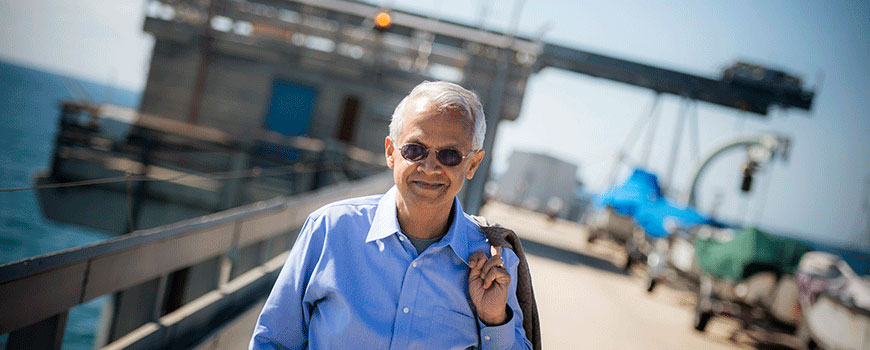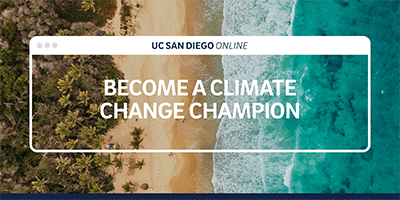| 正文(英文) |
 Scripps researcher V. Ramanathan seeks to bring climate change solutions to a global audience with "Bending the Curve"
Scripps Institution of Oceanography climate scientist Veerabhadran Ramanathan has long had the goal of educating and empowering “one million climate warriors” who will help society tackle the world’s greatest existential threat.
A series of new massive open online courses (MOOCs) being offered to the public could provide a substantial leap toward reaching that goal. “Bending the Curve: Climate Change Solutions” is a four-part course series that will be made available to anyone – from high school students to retired professionals – who are interested in solutions to the climate change crisis.
“The potential for delivering this incredible course to the growing community of environmental professionals, teachers and citizens served by University Extension inspired us to immediately join the team to help connect it to a larger public audience,” said Mary Walshok, the dean of UC San Diego Extension.
The course covers the underpinnings of climate change science and impacts on health of people and health of the planet. Its primary focus, however, is on the multi-dimensional aspects of the solutions to the climate crisis, said Ramanathan. These include societal transformation, governance, market measures, technologies for bending the curve of emissions of carbon and super pollutants, ecosystem management and extraction of carbon from the air. The four-part series includes recorded lectures from 25 experts in climate science, social science, public health, policy, economics, energy technologies, super pollutants and ecosystem management from across the UC system and elsewhere.
“Its uniqueness is addressing the interconnectedness of the problem and how all of society including faith communities have to come together to address this crisis,” said Ramanathan. “The course lectures also address the inter-generational and intra-generational equity and ethical issues bringing in vividly the plight of the world’s 3 billion or more vulnerable people.”
The Bending the Curve MOOC is also supported by an open-access book authored by the lecturers of the course, published by eScholarship at the California Digital Library in the University of California Office of the President and funded by the Gates Foundation.
Karen Flammer, director of digital learning at the Teaching + Learning Commons at UC San Diego, and her team are spearheading the push to bring the course to the public via UC San Diego Online, online.ucsd.edu. Anyone can enroll in “Bending the Curve” and audit the courses for free. Those wishing to take the instruction further can pay $49 per course for access to additional assessment activities that earn them a statement of accomplishment upon successful completion. “Bending the Curve” is not a credit-bearing course, but Flammer envisions that in some instances organizations may use completion of this course series as a form of training in climate change literacy.
“One of the goals is to increase public access to UC San Diego’s scholarship,” Flammer said. “We want to make this content accessible to a global audience and we finally have a platform that makes this possible.”
“Bending the Curve” uses much of the recorded instructional material created for an undergraduate course that has been offered across the UC system since 2018. The for-credit college hybrid course was an extension of the 2015 report “Bending the Curve: Ten Scalable Solutions” that accompanied a landmark summit held at Scripps Oceanography at which University of California leaders declared their intention to have the system be carbon-neutral by mid-decade. (The university announced May 19 that it had completed divestment from fossil fuels in its investment portfolio.) Ramanathan, the report chair, along with one of the two vice-chairs of the report, Fonna Forman, an expert in environmental and social justice at UC San Diego, piloted the undergraduate course at UC San Diego in 2017 before its official launch at all UC campuses.
“The COVID-19 crisis produced a massive social response because people understood the immediate risks to their health and the health of vulnerable loved ones,” Forman said. “Climate change is no different. In fact, it poses a far greater risk to public health than COVID-19. The goal of our MOOC is to make climate less abstract and more relevant, personally investing each individual in the challenge.”
Course leaders say it “focuses on the multidimensional aspects of the climate change problem and presents a set of scalable solutions, from technological innovation and ecosystem management to market mechanisms and behavior change, designed to disrupt the changes taking place. The course teaches how individuals, communities, businesses, religious leaders and nations – that is, everyone – can take action and bend the curve of climate change towards a more sustainable future.”
“This course indeed took a village to create,” said Ramanathan. “Fifty faculty from all ten campuses of the UC system, the Innovative Learning Technology initiative at the UC Office of the President, the Gates Foundation which funded the open access book, and students who shared their experiences during the pilot phase. We now have to make sure that people around the world benefit from the lessons on solutions in the MOOC series to this grave crisis facing the entire planet.”
The first “Bending the Curve: Climate Change Solutions” MOOC course had a soft launch on UC San Diego Online on May 26. Learners can continue to sign up to take the first course in the series until July 28 and would have until Aug. 31 to complete it. The subsequent courses in the series are offered in staggered fashion with the final capstone course beginning in December. That final course will require students to propose and outline a climate solution that can be implemented in their community. Other learners will be required to act as peer reviewers, offering feedback on the climate solutions. UC San Diego undergraduate students will serve as course monitors.
Flammer hopes the first run of the course might draw as many as 5,000 sign-ups though the platform has the capacity to accommodate tens of thousands of learners.
Note to broadcast and cable producers: University of California San Diego provides an on-campus satellite uplink facility for live or pre-recorded television interviews. Please phone or email the media contact listed above to arrange an interview.
About Scripps OceanographyScripps Institution of Oceanography at the University of California San Diego, is one of the oldest, largest, and most important centers for global science research and education in the world. Now in its second century of discovery, the scientific scope of the institution has grown to include biological, physical, chemical, geological, geophysical, and atmospheric studies of the earth as a system. Hundreds of research programs covering a wide range of scientific areas are under way today on every continent and in every ocean. The institution has a staff of more than 1,400 and annual expenditures of approximately $195 million from federal, state, and private sources. Scripps operates oceanographic research vessels recognized worldwide for their outstanding capabilities. Equipped with innovative instruments for ocean exploration, these ships constitute mobile laboratories and observatories that serve students and researchers from institutions throughout the world. Birch Aquarium at Scripps serves as the interpretive center of the institution and showcases Scripps research and a diverse array of marine life through exhibits and programming for more than 430,000 visitors each year. Learn more at scripps.ucsd.edu and follow us at Facebook, Twitter, and Instagram. About UC San DiegoAt the University of California San Diego, we embrace a culture of exploration and experimentation. Established in 1960, UC San Diego has been shaped by exceptional scholars who aren’t afraid to look deeper, challenge expectations and redefine conventional wisdom. As one of the top 15 research universities in the world, we are driving innovation and change to advance society, propel economic growth and make our world a better place. Learn more at www.ucsd.edu.
This story appears in explorations now, Scripps Institution of Oceanography's award-winning ocean and earth science magazine. Sign up to receive our free monthly story roundup.
|







修改评论